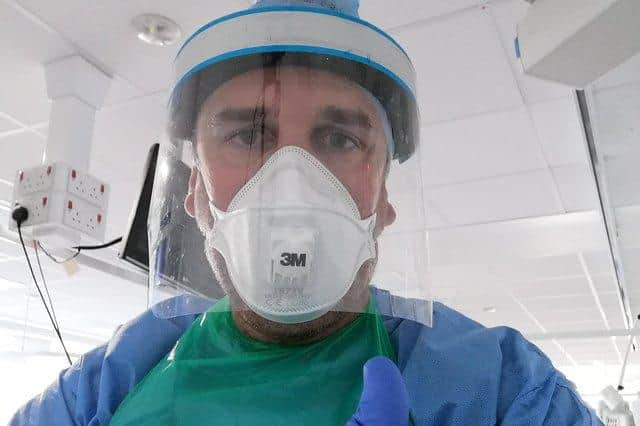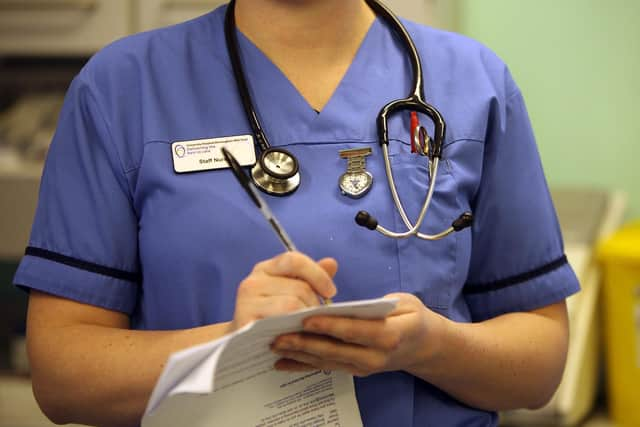Sheffield NHS and care staff at burnout over ‘increased workload and inadequate pay’
and live on Freeview channel 276
Sheffield nurse Joan Pons Laplana, who speaks in his capacity as an GMB activist, said this in response to a highly critical report released by House of Commons Health and Social Care Committee that workers were exhausted and overstretched of staff shortages.
He said it was “quite astonishing” that the report has only been published now when the Government should have been worried about the dire situation years ago, which he said, has been made worse by the Covid-19 pandemic.
Advertisement
Hide AdAdvertisement
Hide AdHe said: “(The Government) has led the situation to be as it is now because the burnout is not just because of Covid. Covid has just sped up what has been happening in the last years. It’s the chronic understaffing that we have in the NHS.


"It worries me because a lot of nurses are retiring early and the only way is to replace them but we need to work a lot more on retainment because nurses who are leaving, they have a lot of experience that cannot be replaced by others because it takes years to reach a certain level of expertise.”
The report, among others, stated one of the main problems was that there was no accurate forecast of how many staff the NHS needed for the next five to 10 years - something it called "workforce planning".
It said there needed to be a "total overhaul of the way the NHS does workforce planning" - and there should be annual reports published on how many workers the NHS would need for the next five, 10 and 20 years.
Advertisement
Hide AdAdvertisement
Hide Ad"It is clear that workforce planning has been led by the funding envelope available to health and social care rather than by demand and the capacity required to service that demand," said the report.


The report also said an excessive workload due to understaffing, which is a key driver to the widespread burnout must be tackled as a priority.
Mr Pons Laplana agreed, saying that the demand has increased yearly – a lot more than the investment the sector is supposed to receive.
"This means there is a gap between what we are willing to provide and the money we have because we need to do a lot more with limited resources, this is what will have an impact in the quality of care.
Advertisement
Hide AdAdvertisement
Hide Ad"You cannot say to the patients we are going to have less activity because we are understaffed...the burnout is not just work, it’s about how we make ends meet too.
"Nurses in London are also leaving because they can’t afford to pay the rent and that has added to the pressure. It’s not that we want to be rich, but we want to be able to do a job and be paid according to our knowledge and care,” he said.
Meanwhile, Royal College of Midwives (RCM) calls for long-term investment in the NHS and its staff to prevent the service haemorrhaging its people.
Alice Sorby, Employment Relations Advisor at the RCM, said: “The pandemic has amplified the pressure that midwives and other maternity staff are under and exposed the gaping hole of understaffing and insufficient resources that besets maternity services and the wider NHS.
Advertisement
Hide AdAdvertisement
Hide Ad"This is simply a failure of successive governments over decades to invest long-term in the NHS, its staff and their pay, and this is pushing many of them out of the door.”
A survey of midwives in November carried out by the RCM found that eight out of 10 (83 per cent) do not believe their NHS Trust or Board has enough staff to operate a safe service.
Services were stretched almost to breaking point, with 42 per cent reporting that half of shifts were understaffed, and a third saying there were very significant gaps in most shifts.
It also found that seven out of 10 (71 per cent) were considering leaving the profession, with over a third (38 per cent) seriously thinking about it.
Advertisement
Hide AdAdvertisement
Hide AdAlice Sorby added, “There are signs for optimism with additional money being put into NHS maternity services for more midwives, doctors and resources.
"However, this does not help our exhausted and demoralised midwives, maternity support workers and their NHS colleagues right now.
"They must be supported to recover from the massive efforts they have made throughout the pandemic – during which time, it’s worth remembering, maternity services never closed.
"The Government must also once and for all acknowledge the value of NHS staff and step-up investment in them to give them hope for the future.
Advertisement
Hide AdAdvertisement
Hide Ad"They must be reassured that their working lives will not be a constant battle to do their very best within a system that does not support them to do it. Now is the time.”
A Sheffield GP, in a recent interview, has also highlighted the immense pressures felt by the medical workers as they struggled with workloads, particularly due to the Covid-19 pandemic.
Dr Ben Allen, GP Partner Birley Health Centre, wrote a public ‘apology and explanation’ and posted it on social media, in which he outlined the reasons why GPs were struggling with workloads, and also sought to dispel some of the ‘myths’ circulating about the care GPs are able to give.
He said the key issue is the ever-increasing workload coupled with the lack of funding.
Advertisement
Hide AdAdvertisement
Hide Ad"I am not trying to blame anybody, but GPs’ work does need more funding,” he said, adding that GPs are given around £150 per year for each patient, and every year the workload increases but any small increase to funding does not nearly keep pace.